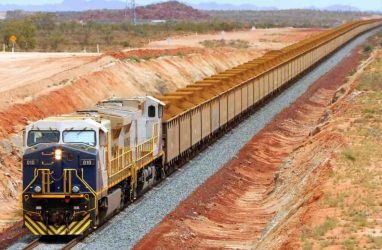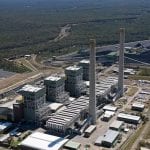Feed aggregator
South Korea secures first government CDM deal in Uzbekistan
Forrest plans multi-billion dollar battery business, hopes to land five big green energy deals
 Andrew Forrest says "world leading" WAE could turn into a multi-billion dollar battery technology business, expects to seal five big green energy deals this year.
Andrew Forrest says "world leading" WAE could turn into a multi-billion dollar battery technology business, expects to seal five big green energy deals this year.
The post Forrest plans multi-billion dollar battery business, hopes to land five big green energy deals appeared first on RenewEconomy.
Energy Insiders Podcast: Do we have enough lithium?
 Lithium analyst Rodney Hooper on supply and demand for key battery metal. Plus: Solar has killed coal, but can it kill gas?
Lithium analyst Rodney Hooper on supply and demand for key battery metal. Plus: Solar has killed coal, but can it kill gas?
The post Energy Insiders Podcast: Do we have enough lithium? appeared first on RenewEconomy.
NSW plan to offer emissions offsets with car registration sends wrong message, critics say
Government told to focus on boosting uptake of electric vehicles, public transport, cycling and walking rather than offset ‘gimmick’
Drivers in New South Wales will be offered the chance to buy carbon offsets when they renew their car registration in a step critics have described as a “gimmick” that could undermine efforts to cut transport emissions.
The NSW treasurer and energy minister, Matt Kean, announced the scheme on Friday saying it would give people “looking for practical ways to take action on climate change” more ways to cut their emissions.
Continue reading...Gas prices boost Origin’s profit, as “green” takeover bidder seeks partners
 Origin releases dramatically higher earnings guidance amid speculation over the commitment of suitors Brookfield and EIG.
Origin releases dramatically higher earnings guidance amid speculation over the commitment of suitors Brookfield and EIG.
The post Gas prices boost Origin’s profit, as “green” takeover bidder seeks partners appeared first on RenewEconomy.
CP Daily: Thursday January 26, 2023
BC’s Incomappleux Valley conservancy secured with public-private funding
Birdsong boosts mental wellbeing for 90% of people, UK poll finds
RSPB shares results as Britons encouraged to spend an hour counting birds in annual Big Garden Birdwatch
Watching birds and hearing birdsong have a positive impact on wellbeing for more than nine in 10 people, according to a survey to mark the largest garden wildlife count in the world.
People are being urged to boost their mental health and help scientists by spending an hour this weekend counting the birds in their garden or local park for the RSPB’s Big Garden Birdwatch.
Continue reading...WCI Markets: CCAs resume downtrend as regulatory uncertainty and auction weigh, Washington waits
NSW shortlists 4.3GW of wind, solar and storage projects in first renewables auction
 NSW shortlists 4.3GW of wind, solar and storage projects in first auction in its plan to replace coal with renewables.
NSW shortlists 4.3GW of wind, solar and storage projects in first auction in its plan to replace coal with renewables.
The post NSW shortlists 4.3GW of wind, solar and storage projects in first renewables auction appeared first on RenewEconomy.
Ratings agency urges UN to learn “lessons” from voluntary carbon market for Article 6 crediting
“We could do better:” Green hydrogen leader pulls Plug on Forrest’s electrolyser factory
 US-based green hydrogen leader pulls Plug on joint venture with Andrew Forrest, saying the economics did not make the project worthwhile.
US-based green hydrogen leader pulls Plug on joint venture with Andrew Forrest, saying the economics did not make the project worthwhile.
The post “We could do better:” Green hydrogen leader pulls Plug on Forrest’s electrolyser factory appeared first on RenewEconomy.
Pilot Russian carbon trades begin at floor price despite Ukraine crisis
Human activity and drought ‘degrading more than a third of Amazon rainforest’
Fires, land conversion, logging and water shortages have weakened resilience of 2.5m sq km of forest, says study
Human activity and drought may have degraded more than a third of the Amazon rainforest, double the previous estimate, according to a study that heightens concerns that the globally important ecosystem is slipping towards a point of no return.
Fires, land conversion, logging and water shortages, have weakened the resilience of up to 2.5m sq km of the forest, an area 10 times the size of the UK. This area is now drier, more flammable and more vulnerable than before, prompting the authors to warn of “megafires” in the future.
Continue reading...The Guardian view on carbon offsetting: a model with dangerous flaws | Editorial
Protecting nature requires financial incentives. Serious problems uncovered in carbon markets must be fixed
The strong reaction to the Guardian’s joint investigation into carbon offsetting shows how much is at stake when the effectiveness of market mechanisms in combating global heating is challenged. Already, in Australia, politicians and scientists have renewed their criticism of public entities using international carbon credit schemes to offset local emissions. Verra, the Washington-based non-profit at the centre of the story, is the world’s leading carbon standard, certifying the credits that companies use to make claims about their environmental impact. It is a blow to anyone committed to the idea that emissions trading can help the world to reach net zero, to learn that 90% of the rainforest credits analysed are unlikely to represent genuine carbon reductions.
The problem, which was uncovered by journalists working alongside experts using satellite images, is the methodology used by Verra to certify its credits. While Verra disputes the findings, and is due to publish its own assessment, the researchers found that the evidence used to calculate offsets was flawed. Predictions of what would have happened in the absence of credits were unreliable, and benefits were overstated.
Continue reading...Government green heating scheme off to slow start
Exxon affiliate invests C$720 mln in Canada’s largest renewable diesel project
ANALYSIS: Avoidance versus removals debate reignites amid REDD over-crediting concerns
True wild camping on Dartmoor not threatened say landowners
Food, feed and fuel: global seaweed industry could reduce land needed for farming by 110m hectares, study finds
Scientists identify parts of ocean suitable for seaweed cultivation and suggest it could constitute 10% of human diet to reduce impact of agriculture
An area of ocean almost the size of Australia could support commercial seaweed farming around the world, providing food for humans, feed supplements for cattle, and alternative fuels, according to new research.
Seaweed farming is a nascent industry globally but the research says if it could grow to constitute 10% of human diets by 2050 it could reduce the amount of land needed for food by 110m hectares (272 acres) – an area twice the size of France.
Continue reading...


